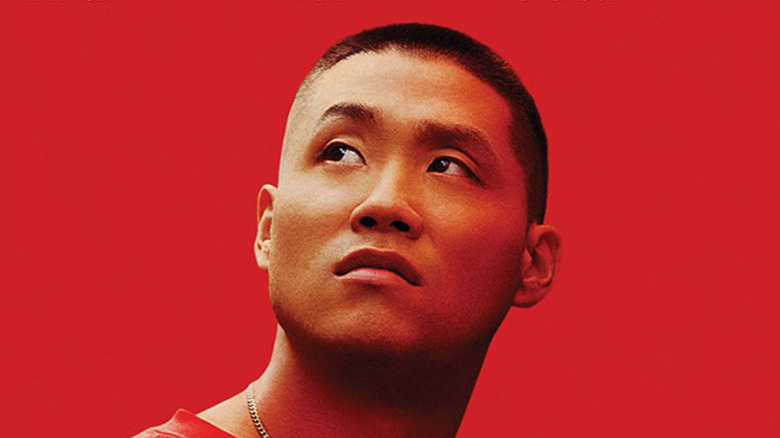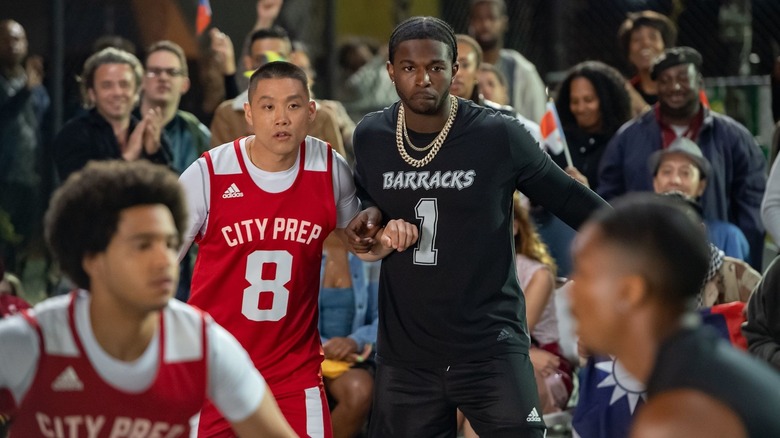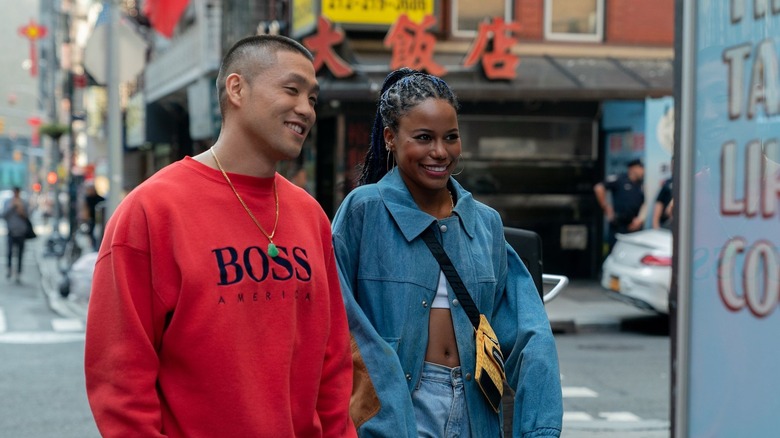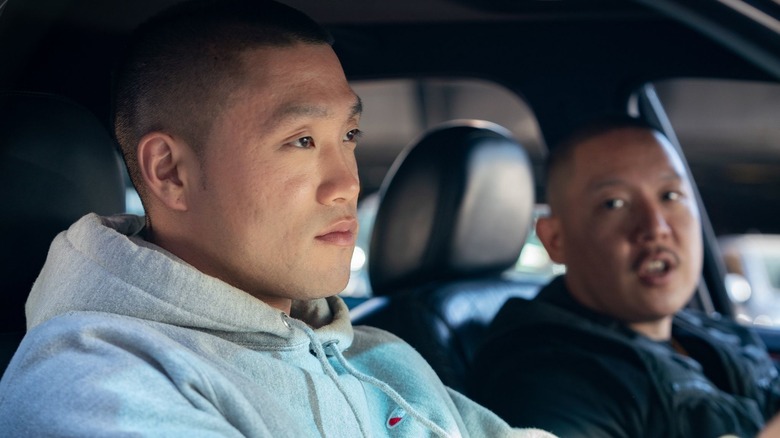Boogie Review: A Missed Opportunity
Early on in the new film Boogie, memoirist and restaurateur Eddie Huang's directorial debut, an AP English teacher tells his class that, whether they know it or not, they are living a coming of age story.
It's said primarily for the benefit of the title character, Alfred "Boogie" Chin (Taylor Takahashi), a young man who has transferred to this prep school for the express purpose of defeating his basketball rival Monk (the late Bashar "Pop Smoke" Jackson) so he can impress college recruiters enough to acquire a full scholarship. More than the rest of his motley supporting cast of New York teens, Boogie is living a coming of age story, one spliced with a run of the mill sports narrative.
But the line is also Huang pressing at the edges of the fourth wall, seeking to leverage the audience's natural aversion to paint by numbers genre exercises, hoping to grease the wheels with some metatextual ribbing. It's a charming notion he employs here. One that, if explored more centrally, could have done a fantastic job plastering over the considerable holes in his first feature length screenplay.
Unfortunately, Boogie, for all its heart and pathos, is a routine exercise trying to be so many things at once — a teen melodrama, a sports film, a hip love letter to NYC — that it loses focus on the most potent weapon in its narrative arsenal, its exploration of the first generation American experience. At its best, it is a film that captures the critical conflict of trying to achieve the American Dream without compromising the culture you come from. It just takes far too many circuitous routes to get there.
An imperfect protagonist
At first blush, Boogie shares a kinship with Spike Lee's 1998 film He Got Game. But where that film so effortlessly blended its distinct environment, its thorny familial issues, and its commentary on the nature of professional athletics to provide an avenue to a better life (both for the athletes themselves and the families that raise them), Huang's effort here fails to stitch those disparate elements into a cohesive tapestry.
When we meet Boogie, he feels like an insufficient central figure to build such a story around. His basic character traits are little more than hand-me-downs from countless other, similar tales.
He's a cocky sort, as averse to constructive criticism as he is unable to fully express the inner turmoil he feels at the predicament thrust upon him in his youth. Circumstance has made his preternatural gift for basketball an albatross around his neck, the conduit through which his family may finally transcend years of hard work and sacrifice. Torn between an ex-convict father (Perry Yung) and an overbearing mother (Pamelyn Chee), Boogie seeks to prove his doubters wrong and secure a future for himself and his parents, all while juggling a newfound romance with classmate Eleanor (Taylour Paige).
However, Takahashi's performance in the lead role, though possessing a certain charisma and the potential for future stardom, can't anchor all that's placed on it. He's a striking presence, to be sure. Audiences will no doubt see more of him in the near future. But the failures in Huang's writing maroon Takahashi in his own picture. There's a stiffness to the character as written that requires an actor to imply an interiority that Huang is not yet adept at capturing as a filmmaker. The film's clumsy visual language just isn't sufficient for such a task, putting more weight on Takahashi's shoulders than this turn can bear.
Cultural cross-pollination
The film attempts to draw the unique perspective of Boogie's story into focus by comparing it, in story, to J.D. Salinger's Catcher in the Rye, with Boogie himself critiquing the book to his teacher. In that particular scene, Boogie, a character who is otherwise not written with the most distinctive voice, temporarily transforms into an unsubtle mouthpiece for Huang to rail against the white literary canon. When Boogie asks his classmates if they've ever truly related to the kinds of stories their teacher assigns, it's implicit that the film itself is meant to represent a corrective counterpoint to that established lineage.
In his defense, Huang puts considerable effort through the film to present a modern, multicultural lens on the typical coming of age narrative. Though the film is written from and about a Chinese-American perspective, its DNA is inexorably entwined with the influence of Black culture, specifically the film's omnipresent hip-hop aesthetic. From the score by Adrian Younge and A Tribe Called Quest's Ali Shaheed Muhammad to Jay Electronica's "Exhibit C" playing in the opening credits to supporting turns from rappers like the recently slain Pop Smoke and Despot (stealing scenes left and right as an assistant coach at Boogie's school), the film heavily relies on the cultural cache provided by the genre's clout.
But in inviting comparisons to classics like Catcher, Huang also indirectly highlights the lack of nuance in much of the film's writing. It's all well and good to present a new story with a diverse cast as the antithesis of the lily-white coming of age tales that came before it. But when the storytelling on display fumbles at forcing the ill-fitting puzzle pieces together into a more meaningful whole, it's no longer enough to merely suggest this is something new and vital.
The way the teens communicate feels flat and awkward at times, like a millennial ghostwriting in mush-mouthed Gen Z slang for a brand tweet. But it rings the most false when Huang chooses to conflate the experiences of the Asian community with the plight of Blacks in America. It's a sensible and logical idea to explore, given the interracial romance at the heart of the film. But at a time when the thorny and complex relationship between the two minorities has been brought into such sharp focus through the juxtaposition of the George Floyd protests and the recent rise in anti-Asian hate crimes, Huang's writing is too blunt and Hallmark to do these ideas justice.
The Family Drama We Deserved
For all its drawbacks, Boogie works best when it's fixing its gaze onto its main character's difficult family life.
The film uses a fascinating framing device in its prologue and conclusion. Before ever introducing us to Boogie himself, Huang introduces us to his parents before his birth, meeting a fortune teller to gain insight into the potential change their lives will go through by bringing a child into this world. It quickly and effectively highlights the central conflict between his mother and father, both culturally and attitudinally, that will form the foundation of all Boogie's flaws and hangups.
The sequence lends a tragic determinism to Boogie's life story, that forces beyond his control set him up for the film's central crossroads before he first drew breath. As he struggles to keep his hot head in check at his new school and recruiters keep offering him positions on their university's teams that don't come with a full ride, Boogie is caught between two options. He can stick with his father's obsession that all it will take to get a scholarship is to prove his worth by besting the other best player in the city in one game. Or he can appease the mother he feels especially distant from by agreeing to take a deal to move to China and play for the CBA, a path that will bring his poor family immediate financial gain but may endanger his NBA aspirations.
It's in these scenes, removed from the indistinguishable teen melodrama of Boogie's school life, that the film truly comes alive. Both Yung and Chee as Boogie's father and mother deliver strong work, compacting years of offscreen turmoil into the film's brief explosions of their domestic plight. In capturing the complexity of immigrant parents' repressed frustrations, Huang's story finds its most nimble and affecting moments. The moments in their cramped home, where all that's been bubbling under the surface and years of debt lurches to the surface, make you yearn for a film that solely focuses on this family unit and not the other tired sports movie ephemera.
Elsewhere he seeks to upend the prevailing model minority myth and create a unique coming of age tale for representation-starved Asians, but the real money was in the smoldering family drama he buries underneath a pile of unspectacular genre trappings we've seen executed better elsewhere for decades. Boogie is a missed opportunity to be sure, but for a first-time filmmaker, it houses the potential for a better turn at bat in the near future.



